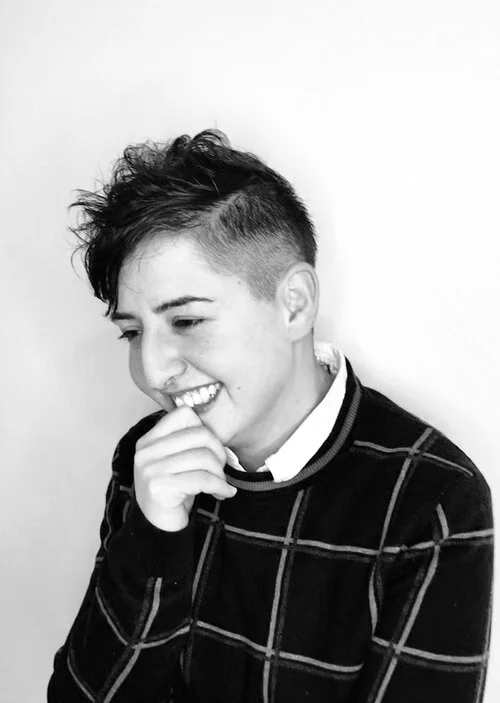New musical audio play has frank conversations about queerness, motherhood, relationships, and more
Queer local artists star in the frank theatre company’s adaption of Catherine Hernandez’s I Cannot Lie to the Stars That Made Me
Emily M Cheung (far left), KhattieQ, Anjalica Solomon, and Lili Robinson. Photo by Kimberly Ho.
the frank theatre presents I Cannot Lie to the Stars That Made Me from January 7 to 16 online via its website for free.
LOCAL MULTIDISCIPLINARY ARTIST Fay Nass’s earliest memories go back to the Teatr-e Shahr, the Tehran City Theatre where her aunt worked as an actor and director. She would tag along to rehearsals and go behind the scenes from as young as age three right up until her family left Iran for Canada when she was 17. “It was magical,” Nass tells Stir.
Those experiences in the arts planted the seed for a career that sees the non-binary queer theatre director exploring race, sex, culture, and identity in her work. Now, the artistic director of the frank theatre company is mounting a queer musical-audio play that reflects the organization’s very purpose and heart. Its adaptation of I Cannot Lie to the Stars That Made Me by ground-breaking author Catherine Hernandez, a queer woman of colour, premieres January 7 to 16 online and is being offered for free listening. The story features four women who gather around a campfire to swap stories and share in strength and healing.
So many things about the play appealed to Nass, who is also the founder and artistic director of Apothic Theatre, has a master’s in fine arts from Simon Fraser University, and is doing the artistic leadership residency at the National Theatre School of Canada. For one, it fits with the frank theatre company’s mandate to elevate the voices of queer and nonbinary women of colour. Consider that the percentage of female playwrights in Canada is small to begin with; “when you add queer and race on top of that, the number just keeps getting smaller,” Nass says.
Established in 1996, the frank is the oldest professional queer theatre company in Vancouver and one of few theatre organizations in the entire country to be led by a genderqueer, immigrant woman of colour. Collaborating with LGBTQ2SIA+ artists and arts workers, the frank aims to subvert Eurocentric styles of and approaches to storytelling.
“The notion of the queering of storytelling is not only about content or the playwright but also about queering the form, the way we think about structure,” Nass says by phone. “A lot of the shows I program are outside of the regular format or structure of well-made plays. Originally from Iran, I always love poetry; it’s something that’s in Persian DNA, and so there was something about the structure of this piece… While it was political it was also lyrical, it was imaginative. It was talking about very hard stuff, resilience and struggles of women of colour, but at the same time there was music in it. There was a very unique style of intergenerational or ancestral witnessing of the process of storytelling embedded in the piece that I felt on a visceral level. In some ways I have always been very connected to the stories of my grandparents and great grandparents.”
Fay Nass.
When Nass originally programmed the play three years ago, she envisioned it being performed live on-stage. Given the work’s inherent musicality, the frank made the decision early on in the pandemic to transform it into an audio performance, seeing the challenges of theatre production in the COVID era as a chance to take its work in new directions via different formats. (In related news, just this past week, the years that Nass has spent working on the site-specific production The Café with Apothic Theatre and ITSAZOO Productions came to a disappointing halt: set to premiere at this year’s PuSH International Performing Arts Festival, the team made the difficult decision to postpone due to health concerns. She remains hopeful that it will be presented this summer.)
With musical direction and original composition by Taymaz Saba, the frank’s collaborative rendition of I Cannot Lie to the Stars That Made Me features a cast of local queer artists: Lili Robinson, Anjalica Solomon, khattieQ, and Emily M Cheung. The three witnesses who surround the central character are also choral singers (alto, soprano, and bass) and, by turns, storytellers and teachers. The main figure talks about womanhood, poverty, queerness, motherhood, single parenthood, falling in love, being a woman of colour, friendships, and more.
The play also transcends gender, race, class, and identity with themes can anyone can relate to or learn from, a universality that the world, in all its divisiveness, needs now more than ever.
“For me personally what is always the most interesting thing is to find a kind of universal common ground and also to increase empathy, of what we think is a story of ‘other’ and to find a human connection in those stories,” Nass says. “I feel like to me that’s the most important thing: ideas or concepts of identities that feel so far away when they are different from us, and when we put those on stages or give that invitation to our audience, we become better as humans because we find that common ground. If there is more empathy in the world, we all live a bit more harmoniously. That element is really important on a human level. And on a political level, we just need to keep going to create space for those voices until many, many years from now some sort of equilibrium has been achieved.
“Sometimes equity does not work by saying ‘We’ll do one piece by a woman of colour,’” she adds. “For hundreds of years of systematic racism and misogyny, it takes a lot of conscious decision making in order to change the direction of the pendulum into a possibility of balance.”
For more information, see the frank theatre company.














